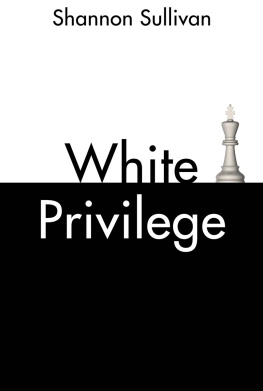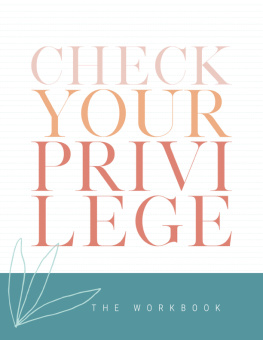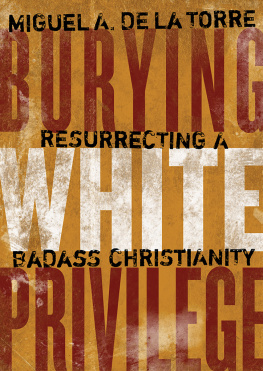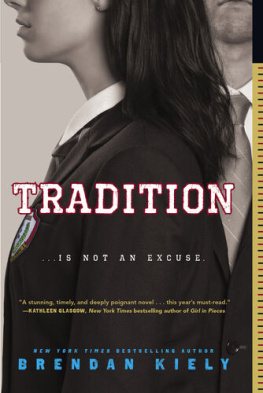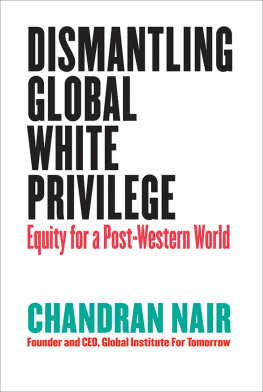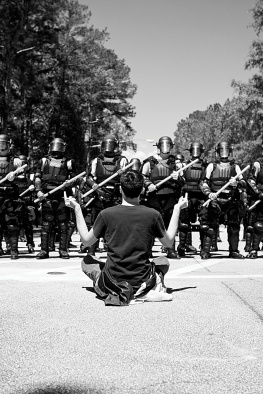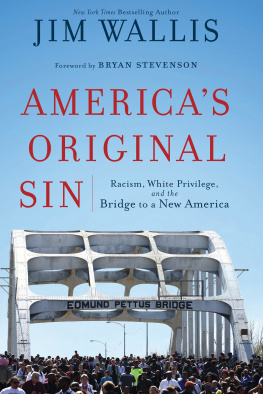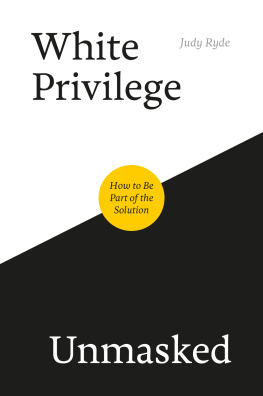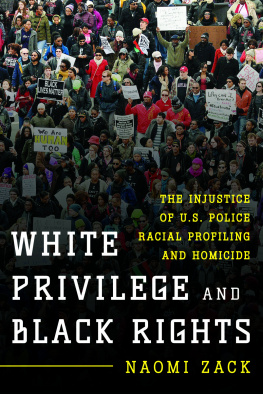
Introducing Politys new series:
little books that make you THINK.
Quassim Cassam, Conspiracy Theories
Stephen Mumford, Football
Shannon Sullivan, White Privilege
White Privilege
Shannon Sullivan
polity
Copyright Shannon Sullivan 2019
The right of Shannon Sullivan to be identified as Author of this Work has been asserted in accordance with the UK Copyright, Designs and Patents Act 1988.
First published in 2019 by Polity Press
Polity Press
65 Bridge Street
Cambridge CB2 1UR, UK
Polity Press
101 Station Landing
Suite 300
Medford, MA 02155, USA
All rights reserved. Except for the quotation of short passages for the purpose of criticism and review, no part of this publication may be reproduced, stored in a retrieval system, or transmitted, in any form or by any means, electronic, mechanical, photocopying, recording, or otherwise, without the prior permission of the publisher.
ISBN-13: 978-1-5095-3530-9
A catalogue record for this book is available from the British Library.
The publisher has used its best endeavors to ensure that the URLs for external websites referred to in this book are correct and active at the time of going to press. However, the publisher has no responsibility for the websites and can make no guarantee that a site will remain live or that the content is or will remain appropriate.
Every effort has been made to trace all copyright holders, but if any have been overlooked the publisher will be pleased to include any necessary credits in any subsequent reprint or edition.
For further information on Polity, visit our website: politybooks.com
Introduction
What everybody knows about white privilege
The idea of white privilege seems to be everywhere nowadays. At least since 2014, with the police shooting of unarmed Black teenager Michael Brown in Ferguson, Missouri, and the subsequent birth of the Black Lives Matter movement, it is no longer a topic confined to academic study. From Harry Potter star Emma Watsons 2018 confession of her white privilege to Black Lives Matters criticism of white Philadelphians who damaged property after their teams 2018 Super Bowl victory, white peoples racial privilege is being talked about by white and non-white people alike. It even has its own Twitter hashtag (#whiteprivilege). Not all of the talk about white privilege has the goal of eliminating it, however. Some of it questions whether white privilege exists and accuses people of color of making up the idea to get an unfair advantage over white people. Some of it accuses white people instead, charging elite whites with using the idea of white privilege to assert their moral superiority by shaming poor and working-class white people. In all the talk and crosstalk about white privilege, its not always clear whether people even mean the same thing when they criticize, support, and/or reject the term. So, what exactly is white privilege and how should we make sense of the various and often conflicting things said about it? And if it does exist, what shouldor canbe done about it?
The goal of this book is to clarify what white privilege is and what it is not. It aims to unsettle pat assumptions about white privilege, and these are assumptions held both by those who are for and by those who are against white privilege. I do not want to preach to the choir of those who oppose white privilege; down that road lies the problem of white peoples smug self-congratulation. But neither will I throw out the concept of white privilege because of the confusions that surround it. Down that road lies the problem of white peoples dismissal of race and racism as trivial, even nonexistent. I think that white privilege exists and that in addition to harming people of color, it dehumanizes white people. (More on the latter claim in .) But I also think that there are important things to learn from people who are skeptical about the notion. Above all, I am aware that stating my opposition to white privilege could seem like white virtue signaling, as if my goal is to assure readers that Im one of the good white people, when I think good white people are a big part of the problem. Ultimately, I would like to persuade skeptics of white privilege and to shake up many treasured ideas held by so-called true believers. And so, I find myself asking, how can we cut through the fog of white defensiveness and white self-righteousness to get to a useful understanding of what white privilege is?
To answer this question, I examine beliefs about white privilege that might seem obviously true, but which I will argue are false in some important way. For example, is white privilege only about race? I will argue, somewhat counterintuitively, that a big part of the answer is no. Likewise, is the point of recognizing white privilege to get rid of it? I also will argue that, in a significant sense, the answer is no. In that way, this book aims for a kind of Socratic wisdom/ignorance concerning white privilege. The ancient Greek philosopher Socrates claimed that genuine wisdom is not found in knowing a large number of things. It instead is found in knowing what you dont know. Realizing that we dont actually know many of the things that we believe to be true about white privilege is what can lead to a greater understanding of it. Doing so, however, means taking seriously ideas or beliefs that can seem unwise or unpopular to hold, and that can be risky. (In fact, Socrates was sentenced to death for questioning the wise people and ideas that reigned in Athens in his day.) I ask you to take some existential risks with me in reading this book. While they wont be as dangerous as the ones that Socrates faced, I should caution you that this is not a feel-good book.
While many of the examples in this book will draw from the United States, white privilege is not merely an American thing. That assumption also is one of the things that everybody knows across the globe: The United States is where racism, white supremacy, and white privilege run rampant. Race, and whiteness in particular, supposedly are not very relevant in Canada and western European countries, for example, some of which (like France) recently have removed all reference to race in their constitution. They did this since race is a social construction and therefore supposedly isnt real. The belief that race and white privilege are exclusively American things dumps problems of racism onto the United States. Treating the U.S. as that racial hellhole on the other side of the Atlantic is an easy way for European countries to avoid looking at their own distinctive forms of racism and white privilege (Fleming 2018, 83). And European countries do have them, as examples in this book will show. The more that we know the United States is uniquely home to persistent problems of white privilege, the more we dont understand white privilege.
Each of the books five chapters is titled with a supposed truth about white privilege. They build from definitions of white privilege, including the complicated issue of who has it ( will discuss white guilt in more detail, let me say here that I think that white guilt tends to be a red herring. Like the fish whose strong smell can throw trained dogs off the scent they are tracking, white guilt often distracts white people from the important question of what they can do to counter white privilege.
Having said that, however, its also important to emphasize that not feeling guilty is not the same thing as feeling confident and assured. This book is likely to make all readers, and perhaps especially white readers, uncomfortable. Questioning settled truths about white privilege can leave people unsure what to believe and what to do with regard to ongoing issues of race and racism. This is just as true for people of color as it is for white people. People of color might become less certain rather than more certain, for example, concerning how white people could be helpful partners in struggles for racial justice. This might sound like something to avoid: whatever their race, who wants to feel uneasy and unsure about fundamentally important questions? But unsettling feelings should not be avoided just because they are unsettling. If what we know to be true about white privilege often is wrong or incomplete in some significant respects, then feeling a bit disoriented and lost is a good first step toward finding a different way to address the issue.
Next page
